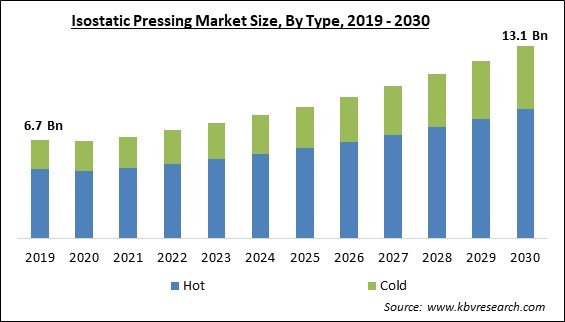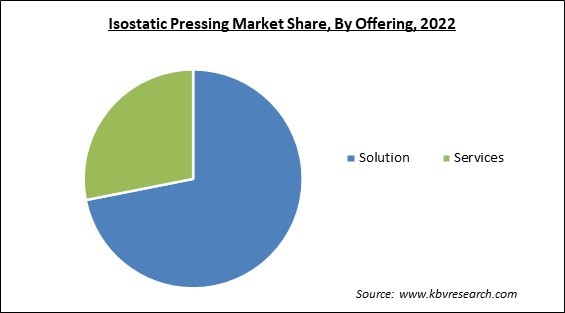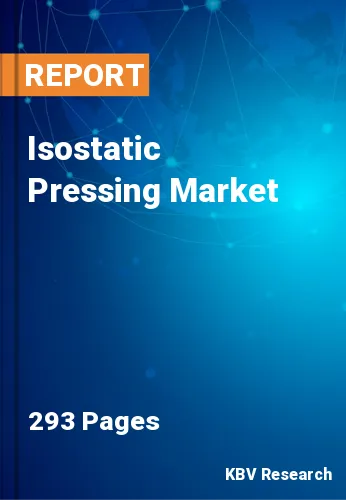The Global Isostatic Pressing Market size is expected to reach $13.1 billion by 2030, rising at a market growth of 7.6% CAGR during the forecast period.
Electronics and semiconductor industry would reach a trillion-dollar size by 2030 as chip demand will increase during the next ten years, thereby, Electronics & Semiconductor segment would register approximately 1/5th share of the market by 2030. Manufacturers, as well as designers, are assessing their position and making sure it puts them in the best possible position to benefit from megatrends like remote working, the rise of AI, and the increasing demand for electric vehicles. Given that growth is anticipated to continue over the long term, industry leaders are strategically concentrating on factories, R&D, and sourcing while using the lessons learned from modeling to identify new areas of opportunity. Some of the factors impacting the market are intensifying focus on combining HIP with other heat treatment methods, growth in the use of additive manufacturing, and demand for large initial investments.

In a traditional practice, the HIP as well as heat treatment procedures are carried out at various facilities. As a result, time-consuming shipping between sites requires to load and unload the parts into process vessels twice. Consequently, integrating HIP with other heat treatment techniques into a single, integrated unit can aid in lowering energy usage and ensuring that components are delivered on time. Since the 1970s, HIP equipment has continuously improved, giving rise to sophisticated processing options such as autonomous processing and quick cooling. Therefore, the growing demand for HIP combined with other heat treatment methods will boost the growth of the market.
With the emergence of Industry 4.0, additive manufacturing (AM), also referred to as 3D printing, is a spectacular technological development that has attracted a lot of attention. The decision to digitalize the business' operations was influenced heavily by environmental sustainability. AM uses CAD (computer-aided design) software or 3D object scanners to instruct machines to deposit layer after layer of material in exact geometric shapes to construct 3D objects. Hence, the increasing demand for AM aids in the expansion of the market.
However, the use of isostatic pressing requires a substantial upfront investment due to the requirement for cutting-edge equipment, specialized technology, and high-pressure vessels. Setting up an isostatic pressing factory entails significant expenses for the equipment needed, for putting safety precautions in place, and for maintenance and training requirements. Established suppliers and competitors may have strong market positions and customer relationships, making it challenging for new entrants to gain market share and hampering overall market growth.
Based on offering, the market is segmented into solutions and services. The solution segment procured the highest revenue share in the market in 2022. In the top sectors of the aerospace, industrial, and biomedical industries, isostatic solutions are growing at the quickest rate. Spare parts with residual porosity can be cleaned with isostatic solutions. Demand for solutions should increase as investments in the automotive, aerospace, and healthcare sectors grow. The key drivers of growth for solutions globally also include the quick rise in demand for low-cost spare part manufacturing procedures in numerous industries, including aerospace and healthcare.

On the basis of industry, the market is segmented into precision machine manufacturing, automotive, aerospace & defense, electronics & semiconductor, energy & power, research & development, healthcare & life sciences, and others. The aerospace and defense segment garnered a significant revenue share in the market in 2022. IP is a popular approach for making different components needed in the aerospace and defense sector since it helps generate complex forms, achieve uniform density, & remove errors. Isostatic pressing is increasing due to its widespread use in manufacturing advanced ceramic components with high strength, thermal resistance, and electrical insulation essential for turbine blades, aerospace engines, heat shields, and insulators.
Based on type, the market is characterized into hot and cold. The cold segment procured a considerable growth rate in the market in 2022. Since cold isostatic pressing (CIP) does not apply to high temperatures, it is more energy efficient and more cost-effective. Therefore, these advantageous characteristics of CIP assist in its widespread application in many sectors, which in turn contributes to the expansion of the segment.
| Report Attribute | Details |
|---|---|
| Market size value in 2022 | USD 7.4 Billion |
| Market size forecast in 2030 | USD 13.1 Billion |
| Base Year | 2022 |
| Historical Period | 2019 to 2021 |
| Forecast Period | 2023 to 2030 |
| Revenue Growth Rate | CAGR of 7.6% from 2023 to 2030 |
| Number of Pages | 293 |
| Number of Table | 550 |
| Report coverage | Market Trends, Revenue Estimation and Forecast, Segmentation Analysis, Regional and Country Breakdown, Companies Strategic Developments, Company Profiling |
| Segments covered | Type, Offering, Industry, Region |
| Country scope | US, Canada, Mexico, Germany, UK, France, Russia, Spain, Italy, China, Japan, India, South Korea, Singapore, Malaysia, Brazil, Argentina, UAE, Saudi Arabia, South Africa, Nigeria |
| Growth Drivers |
|
| Restraints |
|
Region wise, the market is analyzed across North America, Europe, Asia Pacific, and LAMEA. The North America segment acquired the maximum revenue share in the market in 2022. Due to the demand for items treated with HIP in various industries, isostatic pressing in this region is increasingly used. A few HIP producers have installed high-capacity HIP machines at research institutes in North America to develop a wide range of industrial components through highly accurate technology. Additionally, the fabrication of several automobile parts, including carbide tools, uses isostatic pressing. Additionally, it is anticipated that there will be a rise in the tendency to create low-cost products with quicker turnaround times.
Free Valuable Insights: Global Isostatic Pressing Market size to reach USD 13.1 Billion by 2030
The market research report covers the analysis of key stake holders of the market. Key companies profiled in the report include Kobe Steel, Ltd., Bodycote plc, Kennametal Inc., Nikkiso Co., Ltd, Dorst Technologies GmbH & Co. KG, American Isostatic Presses, Inc., EPSI International, Pressure Technology, Inc., Shanxi Golden Kaiyuan Co., Ltd., and MTC Powder Solutions AB (Metal Technology Co. Ltd.)
By Type
By Offering
By Industry
By Geography
The Market size is projected to reach USD 13.1 billion by 2030.
Intensifying focus on combining HIP with other heat treatment methods are driving the Market in coming years, however, Demand for large initial investments restraints the growth of the Market.
Kobe Steel, Ltd., Bodycote plc, Kennametal Inc., Nikkiso Co., Ltd, Dorst Technologies GmbH & Co. KG, American Isostatic Presses, Inc., EPSI International, Pressure Technology, Inc., Shanxi Golden Kaiyuan Co., Ltd., and MTC Powder Solutions AB (Metal Technology Co. Ltd.)
The Precision Machine Manufacturing segment is generating the highest revenue share in the Global Isostatic Pressing Market by Industry in 2022 thereby, achieving a market value of $2.9 billion by 2030.
The Hot segment is leading the Global Isostatic Pressing Market by Type in 2022 thereby, achieving a market value of $8.8 billion by 2030.
The North America market dominated the Global Isostatic Pressing Market by Region in 2022 and would continue to be a dominant market till 2030; thereby, achieving a market value of $4.2 billion by 2030.
Our team of dedicated experts can provide you with attractive expansion opportunities for your business.

